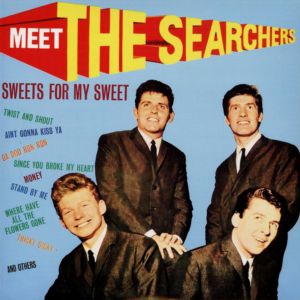
- Format: MP3

Japan 24-Bit Remaster
The Searchers are a British rock band who emerged as part of the 1960s merseybeat scene along with The Beatles, The Swinging Blue Jeans, and Gerry and the Pacemakers.
The band's hits included a remake of the Drifters' 1961 hit, "Sweets for My Sweet"; remakes of Jackie DeShannon's "Needles and Pins" and "When You Walk In The Room"; "Sugar and Spice"; "Don't Throw Your Love Away"; and a remake of The Clovers' "Love Potion No. 9". They were the second group from Liverpool after the Beatles to have a hit in America when "Needles and Pins" charted during the first week of March 1964.
Originally founded as a skiffle group in Liverpool in 1959 by John McNally and Mike Pender, the band took their name from the classic 1956 John Wayne western The Searchers. Prendergast claims that the name was his idea, but McNally ascribes it to 'Big Ron' Woodbridge (born Ronald Woodbridge, 1938, in Liverpool, Lancashire), their first lead singer. The genesis remains unresolved.
The band grew out of an earlier skiffle group formed by McNally, with his friends Brian Dolan (guitar) and Tony West (bass). When the other two members lost interest McNally was joined by his guitarist neighbour Mike Prendergast. They soon recruited Tony Jackson (born Anthony Paul Jackson, 16 July 1938, The Dingle, Liverpool, Lancashire — died 18 August 2003, Nottingham, Nottinghamshire) with his home-made bass guitar and amplifier and styled themselves 'Tony and the Searchers' with Joe Kelly on drums. Kelly soon left to be replaced by Norman McGarry (born 1 March 1942, Liverpool, Lancashire), and it is this line-up — McNally, Pender (as he soon became known), Jackson and McGarry — that is usually cited as the original foursome.
McGarry did not stay long, however, and in 1960 his place was taken by Chris Crummey (who later changed his name to Curtis). Later that year Big Ron had a successful audition with Mecca and became a ballroom singer. He was replaced by Billy Beck, who changed his name to Johnny Sandon (born William Beck, in 1941, Liverpool died 23 December 1996). The band had regular bookings at Liverpool's Iron Door Club as 'Johnny Sandon and the Searchers'.
Sandon left the band in late 1961[1] to join The Remo Four in February 1962. The group settled into a quartet sharing the vocal lead and billed simply as 'The Searchers'. They continued to play at the Iron Door, The Cavern, and other Liverpool clubs. Like many similar acts they would do as many as three shows at different venues in one night. They negotiated a contract with the Star-Club in the St. Pauli district Hamburg for 128 days, with three one-hour performances a night, starting in July 1962.
The band returned to a residency at the Iron Door Club and it was there that they tape-recorded the sessions that led to a recording contract with Pye Records with Tony Hatch as producer. Their first single was issued in US on Mercury, the second on Liberty without success and then a deal was arranged with U.S. based Kapp Records to distribute their records in America.
Hatch played piano on some recordings and wrote "Sugar and Spice"—the band’s second number one record—under the pseudonym Fred Nightingale; a secret he kept from the band at the time.
After scoring with their hit "Needles and Pins", bassist Tony Jackson was fired from the band and was replaced by Hamburg pal Frank Allen (born Francis Renaud McNeice, 14 December 1943, Hayes, Middlesex) from Cliff Bennett and the Rebel Rousers.
Chris Curtis left the band in 1966 and was replaced by the Keith Moon-influenced John Blunt, who in turn was replaced by Billy Adamson in 1970. In 1967, Curtis formed a new band called Roundabout with keyboard player Jon Lord and guitarist Ritchie Blackmore. Although Curtis's involvement in the project was short-lived, Roundabout would eventually evolve into Deep Purple the following year.